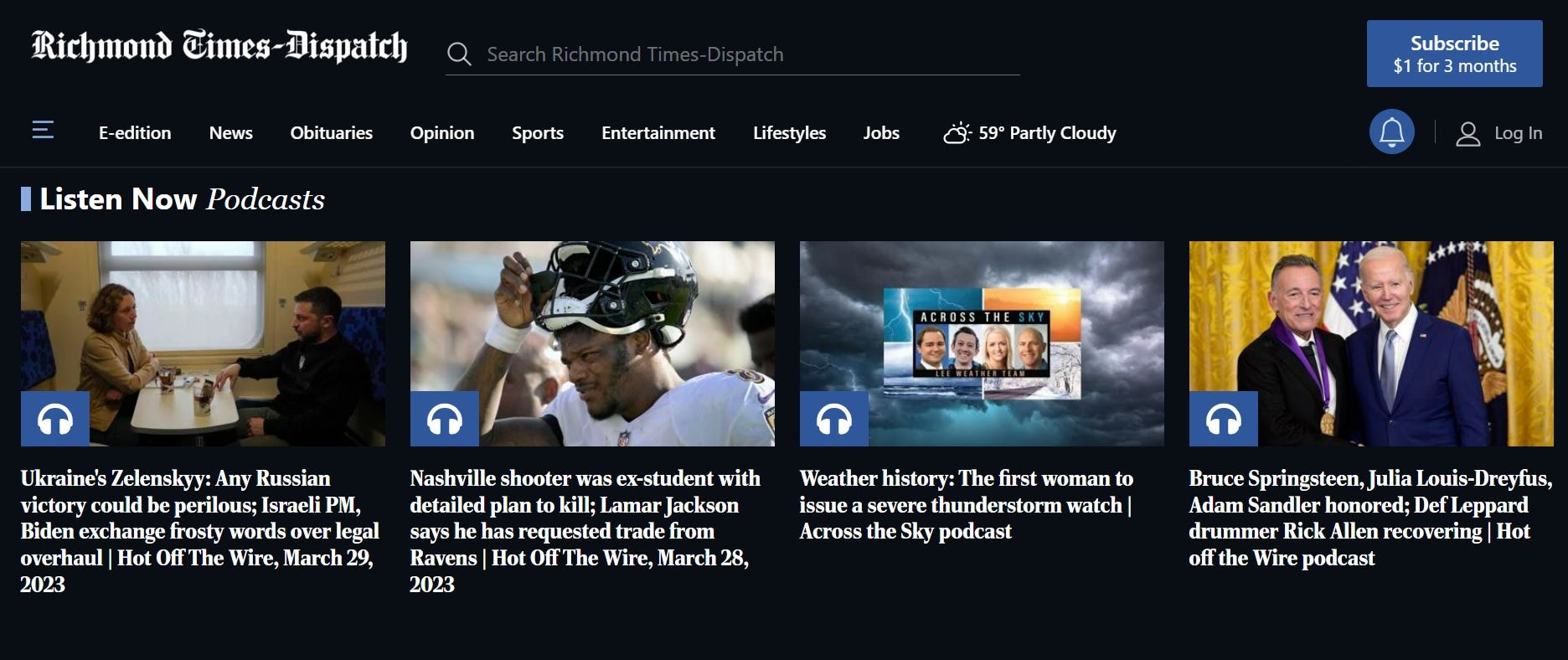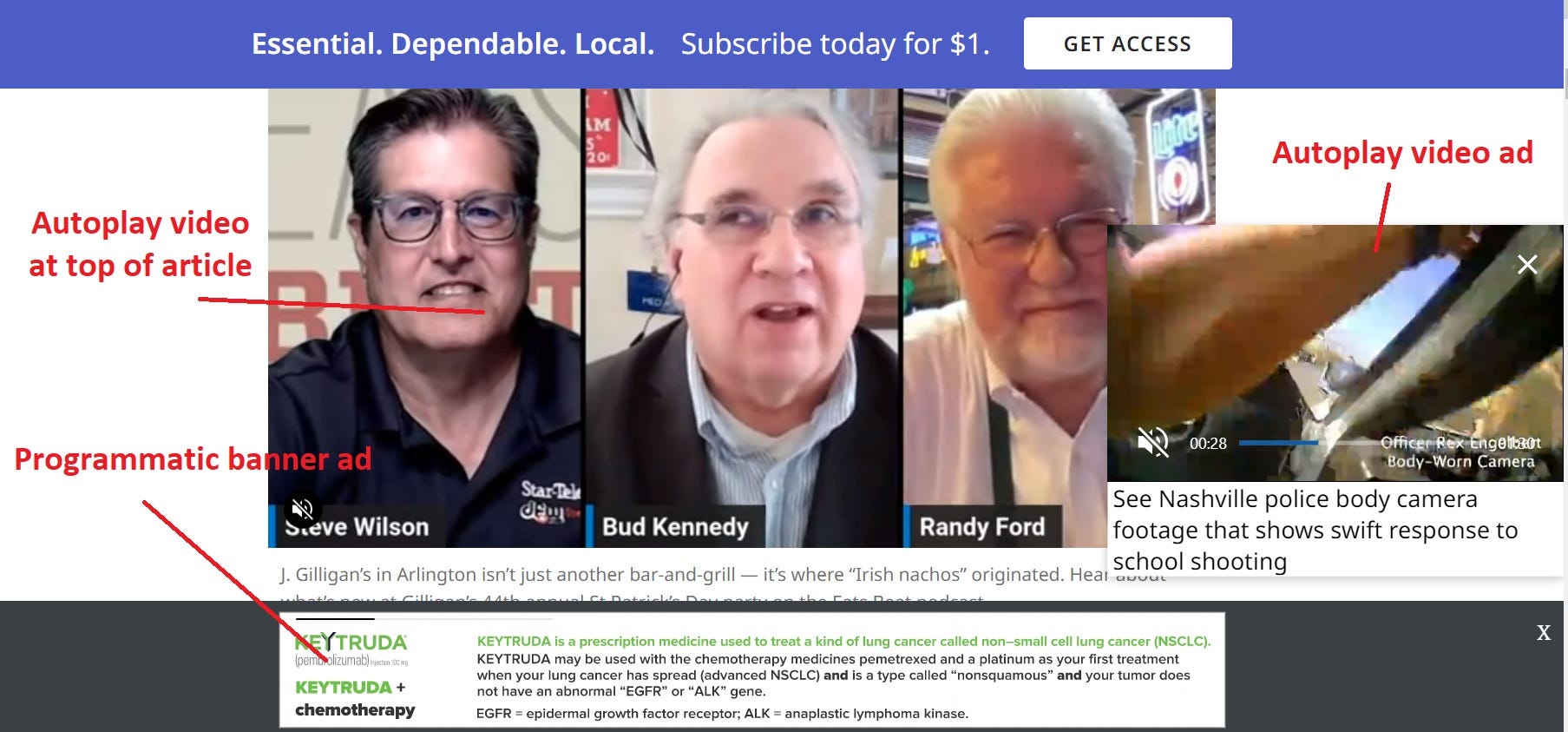Simon Owens's Tech and Media - Local newspapers have lost the plot
Local newspapers have lost the plot...and what they can learn from the recent turnaround from Barnes & Noble.Welcome! I'm Simon Owens and this is my media industry newsletter. If you've received it, then you either subscribed or someone forwarded it to you. If you fit into the latter camp and want to subscribe, then you can click on this handy little button: Let’s jump into it… Local newspapers have lost the plotA few weeks ago, I put a call out in my newsletter for entrepreneurs who are running successful local news organizations. In the mainstream press, the local news industry is portrayed as being in a perpetual death spiral, but I knew from my own observations that there are hundreds of small, local startups that have either achieved sustainability or are very close to doing so. After publishing that call-out, I saw a flood of inbound emails and social media mentions pointing me to thriving news orgs. That then led to phone calls with the leaders behind many of these outlets, and later this year I plan to have several of them on my podcast to talk about how they found viable business models for their content. In the meantime, I want to call attention to three attributes that nearly every one of these outlets — whether nonprofit or for-profit — had in common:
This hypervigilant, lean approach to news production is the opposite of what you see from just about every legacy print newspaper. Not only are these organizations highly centralized — with the decision makers often far removed from the communities being covered — but they are still too focused on publishing commoditized, non-local news to websites that are so weighed down by programmatic ad tech that they’re barely functional. Many of these legacy newspapers are owned by larger media chains, and it’s clear that they’re chasing audience scale in a way that doesn’t actually provide much value to local readers. As one media analyst told The Guardian recently, “The scale of online audience is very impressive but they’ve not worked out how to retain usage and build value for users. The majority of [local news] sites are nowhere near monetising sustainably. The focus seems to be on getting as many eyeballs on a page as you can, but it needs to be about what is valuable." Don’t believe me? Fire up the website for the metro daily in just about any mid-sized city. Let’s start with The Richmond Times Dispatch, which is currently owned by newspaper chain Lee Enterprises. The homepage is littered with non-local stories. Tell me what any of these have to do with Richmond or Virginia: The successful local news operators I spoke to wouldn’t waste even a square inch of homepage real estate on this type of content. It’s not just the content that’s non-local. Many of these sites are plastered with programmatic ads for national and international brands. Take a look at this screengrab I took from an article published by the Fort Worth Star-Telegram, which is owned by McClatchy: This is the kind of stuff that renders a site almost unusable and makes me dread clicking on just about any local news link, especially from my mobile phone. In recent years, many of these newspaper chains have invested in growing their paid digital subscriptions, but most have reported disappointing results. Could you imagine expecting a reader to convert to paid after subjecting them to this level of abuse? Again, none of the successful local media operators I spoke to even bothered with programmatic advertising. In cases where they did accept sponsorships, it was almost solely from local businesses and organizations. This not only maximized value for those advertisers, but it also provided some additional value to the readers who were exposed to those local businesses. Believe it or not, local readers actually appreciate when they’re alerted to news about a new restaurant or community activity. This isn’t to say that newspaper chains can’t succeed, but it’s clear that their heavy-handed, top-down approach to content production and revenue generation isn’t working. They should instead look to the success of Barnes & Noble — a company that’s experienced an impressive turnaround in recent years by empowering its local store managers — for ideas on how to manage their media properties. Here’s how writer Ted Goia described the strategy:
The NYT’s Ezra Klein had a similar assessment of the winning strategy:
Imagine if these nationally-run newspaper chains started putting more power into the hands of the local editors, reporters, and sales staff — giving them a mandate to focus solely on delivering value as defined by their local communities. No more chasing scale for the sake of scale. No more plug-and-play ad and content units that do nothing to serve their audience. Look, I don’t think we’ll ever get back to the pre-internet era in which newspapers operated as local monopolies that benefited from fat profit margins and lavish budgets. But I also think the widely-held belief that local news is unsustainable without government assistance is wrong. Communities value local news and will often reward it with both their attention and money. I just believe that many of the chains and private equity funds that own legacy newspapers have lost sight on how to actually deliver on that value. What do you think?
Your ad here86% of my audience works in media, the creator economy, marketing, and/or tech. If you have a product or service targeted toward these types of workers, then you should consider becoming a sponsor for this newsletter. You can find all the details over here. How Worldcrunch is bringing non-English content to a Western audienceHistorically, foreign correspondents haven’t been the type of journalists who break major news stories in the countries they cover. That’s because they’re typically not as well sourced as the local reporters who grew up in a particular region and have an intimate knowledge of its issues. But what would happen if you could take the work of local reporters and translate it for English-speaking readers? That’s the idea behind Worldcrunch, a media outlet that was founded in 2011. Rather than creating all of its own content, it syndicates articles from publications all around the world and then pays translators to adapt those articles for a Western audience. In a recent interview, founder Jeff Israely talked about his years of work as a foreign correspondent for Time Magazine and how that fueled the idea for Worldcrunch. He also discussed the publication’s evolving business model as it moved from syndication to advertising and subscriptions. You can find our discussion in the video embedded below:  Video embeds not work in your inbox? You can find it over here. Quick hitsOver the last few years, NPR took steps to diversify its content lineup by investing in new podcasts that weren't tied to its radio programming, but its recent layoffs signal a return to a strategy centered around traditional broadcasting. [Vulture] Substack is pitching its own users on becoming investors. [Substack] A veteran journalist who built a substantial following on Substack explains why he's investing in the company. [Ted Goia] The Verge comes in with the cynical take on Substack's decision to allow its users to invest in the company. [The Verge] "Since 2019, when Google opened the floodgates for any publisher to be eligible for Google News and top stories, original news reporting has struggled with copycat publishers regurgitating the news without attribution." [Press Gazette] Investors definitely overestimated how quickly the esports industry would grow and they're currently not in a hurry to pump more money into it. [Sports Business Journal] Jonah Peretti once posited that if he could just merge with several other digital media companies, then BuzzFeed would reach enough scale to better negotiate advertising prices and achieve profitability. That theory hasn't been borne out. [CNBC] ICYMI: How a kids-focused podcaster reached 1 million monthly downloadsJim Jacob accidentally stumbled upon a huge market opportunity when he launched Kids Short Stories. Let’s hang out more oftenI only send out this newsletter twice a week. Here are some places where I curate and comment on industry news on a daily basis: You're currently a free subscriber to Simon Owens's Media Newsletter. For the full experience, upgrade your subscription. |
Older messages
The low-hanging fruit for newsletter publishers
Friday, March 24, 2023
PLUS: I'm looking to expand my brand partnerships
Creator funds are even more bullshit than we realized
Thursday, March 23, 2023
PLUS: How Matt Navarra turned his marketing newsletter into a six-figure business
Is the Morning Brew model crumbling?
Thursday, March 16, 2023
PLUS: I want to get smarter about ad sales
Publishers shouldn't have closed down their comment sections
Friday, March 10, 2023
PLUS: A big announcement for Patreon podcasters
What to make of the paltry payouts from YouTube Shorts
Thursday, March 9, 2023
PLUS: Why aren't there newsletter ad agencies?
You Might Also Like
What Is Kanna — and Can It Really Reduce My Anxiety?
Thursday, March 20, 2025
Plus, cool teens on their favorite jeans. The Strategist Every product is independently selected by editors. If you buy something through our links, New York may earn an affiliate commission. March 19,
A Democratic Party Cage Match Is Coming. It’s Going to Be Great.
Wednesday, March 19, 2025
March 19, 2025 AMERICAN AFFAIRS A Democratic Party Cage Match Is Coming. It's Going to Be Great. By Ross Barkan Photo: Haiyun Jiang/The New York Times/Redux For the first time in two decades, it is
GeekWire Mid-Week Update
Wednesday, March 19, 2025
Read the top tech stories so far this week from GeekWire Top stories so far this week The surprising way Microsoft CEO Satya Nadella uses AI to consume podcasts on his commute Satya Nadella is a fan of
What A Day: Spring breaking the law?
Wednesday, March 19, 2025
Donald Trump's crackdown on college activists is spreading anxiety on campus — and worries about the courts' power to stop him. ͏ ͏ ͏ ͏ ͏ ͏ ͏ ͏ ͏ ͏ ͏ ͏ ͏ ͏ ͏ ͏ ͏ ͏ ͏ ͏ ͏ ͏ ͏ ͏ ͏ ͏ ͏ ͏ ͏ ͏ ͏ ͏ ͏
Flywheel Conference: Meet us in Wenatchee, May 21-23!
Wednesday, March 19, 2025
Discover Washington State's premier event for entrepreneurs and investors to connect GeekWire is pleased to present this special sponsored message to our Pacific NW readers. Watch startups compete
🔐 Secure Your Internet Connection
Wednesday, March 19, 2025
You deserve a digital shield for your online life In a world where headlines scream about abuses of power, your right to privacy has never been more critical. As a conscientious citizen who wants to
Rock the Vote
Wednesday, March 19, 2025
Contrary to popular opinion... ͏ ͏ ͏ ͏ ͏ ͏ ͏ ͏ ͏ ͏ ͏ ͏ ͏ ͏ ͏ ͏ ͏ ͏ ͏ ͏ ͏ ͏ ͏ ͏ ͏ ͏ ͏ ͏ ͏ ͏ ͏ ͏ ͏ ͏ ͏ ͏ ͏ ͏ ͏ ͏ ͏ ͏ ͏ ͏ ͏ ͏ ͏ ͏ ͏ ͏ ͏ ͏ ͏ ͏ ͏ ͏ ͏ ͏ ͏ ͏ ͏ ͏ ͏ ͏ ͏ ͏ ͏ ͏ ͏ ͏ ͏ ͏ ͏ ͏ ͏ ͏ ͏ ͏ ͏ ͏ ͏ ͏ ͏ ͏ ͏
Madrona turns 30 | Microsoft HR chief shifts role | Icertis lands $50M
Wednesday, March 19, 2025
Google's $32B acquisition of Wiz will shake up cloud security ADVERTISEMENT GeekWire SPONSOR MESSAGE: Revisit defining moments, explore new challenges, and get a glimpse into what lies ahead for
Last call to grab tickets for GeekWire's Microsoft@50, featuring Ballmer, Smith and Myhrvold
Wednesday, March 19, 2025
Last call to grab tickets for GeekWire's Microsoft@50, featuring Ballmer, Smith and Myhrvold View this email in your browser GeekWire's Microsoft@50 event, marking the tech giant's
🔪 Trump’s Tuesday Night Massacre
Wednesday, March 19, 2025
The billionaire's rage-tweets made your medicine more expensive while killing your town's small businesses. Forward this email to others so they can sign up 🎧 Lever Time Premium EXCLUSIVE:

